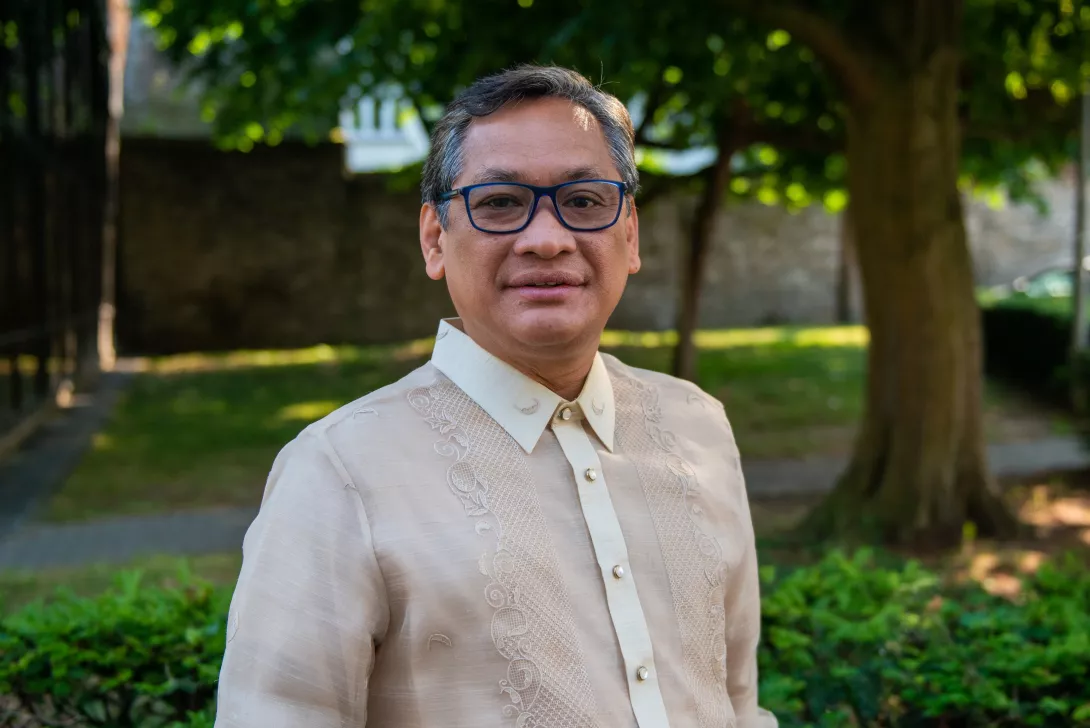
Crucial issues for the future of the Philippines
Most of the projects focus on issues of importance to the Philippines: access to documentation, climate change, natural disasters, migration and the environment.
These collaborations are made possible thanks to different types of funding: governmental and non-governmental for bilateral collaborations, European funds to promote multilateral collaborations and institutional funding. There have also been several doctoral theses, scientific publications and international events.
Meeting with the Ambassador
In May 2023, UNamur welcomed His Excellency Jaime Victor B. Ledda, Ambassador of the Republic of the Philippines, for an initial meeting that provided an opportunity to exchange views and discuss current and future projects.
Present at the international conference on Thursday 8 June for an introductory speech, His Excellency expressed his satisfaction at seeing long-standing collaborations take shape and consolidate. He stressed the importance of raising awareness among researchers of the issues facing the Philippines, in order to encourage new research collaborations and promote (inter)academic, economic and political networking.
Climate change and water management are major challenges, as are renewable energies and aerospace. The Philippines has a space agency since 2019. The Ambassador emphasized that we need to pool our strengths to work together to meet the societal, social and environmental challenges arising from space policy.
Annick Castiaux, the University of Namur Rector also mentioned space-related research, recalling the UNamur recent membership of the UniversEH alliance.
Exchange programmes such as ERASMUS+ are also strongly encouraged. It is important to support future Filipino doctoral students so that they can become involved in research projects with Belgium, and UNamur in particular. They can then benefit from the expertise of researchers at the ILEE Institute on issues such as deforestation, natural resource management, agriculture, food security, natural disasters, population migration and social justice.
A long-standing collaboration
The collaboration between scientists at the University of Namur and several Philippine institutions has continued to develop and expand over the last four decades. It dates back to 1992, when Françoise Orban, a professor in the Department of Geography at UNamur, and the Director of the Institute of Environmental Sciences for Social Change (ESSC) at the Jesuit Ateneo de Manila University met and decided to pool their expertise.
Thanks to this collaboration, the partners have been able to contribute to the defence of the property rights of local indigenous populations, rights that are being trampled underfoot by the large international companies responsible for massive deforestation. Several other research projects have followed this first one, in collaboration not only with other Philippine universities, but also with local partners and other Belgian and international universities.
The Philippine studies program
The University of Namur has been chosen by the Philippine government, along with seven other universities around the world, to promote the various facets of Philippine studies in Belgium and Europe.
The Philippine studies program is funded by a grant from the Philippine government through the initiative of Senate President pro tempore Loren Legarda. The University of Namur has been chosen by the Philippine government, along with seven other universities worldwide, to promote the various facets of Philippine studies in Belgium and Europe.
This program highlights the collaborations that researchers at the University of Namur have developed with several universities and researchers in the Philippines. It also contributes to the promotion of Philippine studies at an international level. It includes several themes and activities that will run until June 2023, and is also an opportunity to explore new avenues of collaboration at academic, cultural and political levels.
Find out more about the Philippine studies programme on the website


